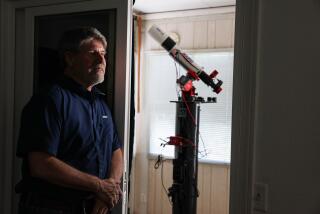TV REVIEWS : Nova Examines the ‘Doomsday Asteroid’
- Share via
“The End Is Coming!” “We Could Be Next!”
After watching tonight’s “Nova” presentation of “The Doomsday Asteroid,” you’re about ready to don a sandwich board and parade in front of the United Nations in hopes that someone will do something before a big rock from space blows us all into the Space Shuttle’s orbit.
The normally reserved “Nova” series takes on somewhat of a tabloid tint (for PBS anyway) in its rather breathless look at the possibility of an asteroid or comet smashing into Earth. “A big one could come in at any time,” the narrator intones repeatedly. “How safe are we?”
For the record, pretty safe. As we finally learn, toward the end of the broadcast, the risk of an individual being affected by a comet catastrophe on Earth is considerably lower than that associated with our usual disasters--earthquakes, floods, tornadoes and the like. One scientist equates it to the risk of dying in an airplane crash--which could either make one feel safer on an airplane or petrified to walk out the front door.
Wanda and Robert Donahue didn’t have a chance to get out their front door when a meteorite (a small space rock) crashed through the ceiling of their Wethersfield, Conn., home on Nov. 8, 1982. “We celebrate the anniversary every year,” they tell the cameras in a curious monotone reminiscent of the alien beings in the film “Invasion of the Body Snatchers” (you don’t think . . . nah!).
“Nova” uses this and other benign examples (including another strike in the same town 10 years before) to illustrate that a heavenly body can indeed strike “anywhere, any time.” The last major hit, however, was in 1908 in Siberia, where an asteroid or comet (the former is rockier, the latter icier) exploded in the atmosphere, violently gouging the land.
“Had this been New York City,” we are told, “at least half a million people would have died.”
“Doomsday” impressively combines animation with real footage to give a flavor of the devastation such an impact would wreak, as it did 65 million years ago, when the dinosaurs were wiped out (many believe, by the environmental effects of that blast).
Whether you believe in the inevitability of an Earth impact, scientists now know the sky is filled with whizzing boulders, many of which cross the Earth’s orbit. But what can we do about it? On short notice, apparently not much.
“The reality is, it will happen,” says Victor Clube of Oxford University. “And when it does, it will happen fairly suddenly.”
* “The Doomsday Asteroid” airs on “Nova” at 8 tonight on KCET-TV Channel 28.
More to Read
The complete guide to home viewing
Get Screen Gab for everything about the TV shows and streaming movies everyone’s talking about.
You may occasionally receive promotional content from the Los Angeles Times.






